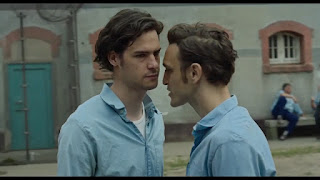The Great Freedom (‘Große Freiheit’) / 2021 Directed by Sebastian Meise
Looking for Christ in this film was easy. The protagonist Hans (Franz Rogowski) has this hope which he brings into every situation which others find challenging, abrasive, even scary. No matter what evidence he is faced with, he just won't stop believing in possibility. He has a relentless and unsentimental ability to clear the way for love. He sacrifices himself for those he loves at several points in the film, undergoing torture and captivity in order for them to be free. He makes every effort to bring healing to those who need it, notably in holding Viktor (Georg Friedrich) through cold-turkey. He even leaves messages for those he loves in the Bible, messages written in light no less.
He has the bravery and innocence to exist, to 'stand transparently before God', to be himself in the face of whatever wickedness he is subjected to. What he wants to do is have sex with men; not a particularly complicated or grand aim, granted. But what makes Hans christic is not this ordinary desire, but rather the existential courage to take up his cross and live in the historical circumstances whatever they may be. This is a story about someone who lives in the world, but is not of it.
It is something of a miracle that such a Jesus-y character is not irritating. And the film did get close to annoying me. Hans, as the screwing-man's Jesus, can pull off the innocence, but sometimes the script overplays the same quality when it comes to Viktor and Hans' other boyfriends. They felt a bit too close to shouting things like 'O the inhumanity!' I guess it was a testament to the restraint of the film (which is a melodrama after all) that these small moments of moral exposition were so noticeable.
In short, at points I felt the drama leaning a touch too heavily on our modern liberal judgement against the homophobic recent past. Which is not to say that gay people being locked up isn't evil—it is. Or that the situation of gay people sent to the camps by the Nazis and then kept in prison by West Germany isn't gut-wrenchingly poignant by itself—it certainly is. But overall I believe the film is pointing to even more than all this.
--SERIOUS SPOILER TIME--
I was excited to see how they would handle Hans' release. Is this his resurrection? As he went into the gay bar with the jazz and the free sex I couldn't help feeling disappointed. My understanding of the film was that this character's freedom is portrayed as ultimately triumphant over the society that had tried to crush him. Him having a pat on the head and some treats felt like a weak, even insulting ending. But then, as Hans descends into the sex dungeon, it is not difficult to intuit that he is not at all turned on, but feels instead hollow, or somehow perturbed.
Here is how I encountered the heart of the film: it was only in the scenes relating to his release from jail that I truly realised that Hans and Viktor were truly in love, in a way not yet depicted in the film. Like they were married. Next to that freedom, the true freedom of service and love, what is a sex party?
As he walks through the darkness of the dungeon the screen goes completely dark for some long seconds, and it was then I knew that his release is not the resurrection, but rather the death and the harrowing!
And so the film leaves us on the eve of resurrection, but nonetheless sure of it, tasting it, as we do with the shorter ending of of Mark's Gospel. Having committed a crime, Hans sits on the curb and waits to return to Viktor.



Comments
Post a Comment